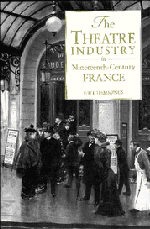Book contents
- Frontmatter
- Contents
- Chronology
- Introduction
- PART I THE AUDIENCES
- 1 Going to the theatre in the nineteenth century
- 2 The auditorium
- 3 Performance times – intervals – annual closures
- 4 First nights and previews
- 5 Order and disorder in the theatres
- 6 Applause and censure
- 7 The claque
- 8 Working-class audiences
- PART II THE ACTING PROFESSION
- PART III THE PROFESSION OF PLAYWRIGHT
- Notes
- Bibliography
- Guide to further reading
- Index
4 - First nights and previews
Published online by Cambridge University Press: 07 December 2009
- Frontmatter
- Contents
- Chronology
- Introduction
- PART I THE AUDIENCES
- 1 Going to the theatre in the nineteenth century
- 2 The auditorium
- 3 Performance times – intervals – annual closures
- 4 First nights and previews
- 5 Order and disorder in the theatres
- 6 Applause and censure
- 7 The claque
- 8 Working-class audiences
- PART II THE ACTING PROFESSION
- PART III THE PROFESSION OF PLAYWRIGHT
- Notes
- Bibliography
- Guide to further reading
- Index
Summary
The first performance of a new play has always held a special attraction for lovers of the theatre. Whenever one was announced in the eighteenth century audiences tended to be more excited and more partisan than at subsequent performances when the novelty had worn off. This was only to be expected, particularly if rumours about the work had circulated in advance to be bandied about by café wits, and curiosity was added to high expectations, the former easily satisfied, the latter usually dashed. With the extreme paucity of original dramatic works produced outside Paris, such events were confined, in practice, to the capital. ‘It's a great day’, wrote Voltaire to one of his correspondents, ‘For the elegant idlers of Paris when a new play is put on; everyone wants a box and at midday footmen are to be seen everywhere in the auditorium’ occupying the seats in readiness for their masters. ‘The play is judged before it is even seen; wherever there is a gathering of women and fops, it is a major topic of conversation; the coffee-houses are full of people discussing it; there are crowds in the street as there will be by and by in the pit.’ The pit would manifest its opinion in no uncertain way, particularly if it felt the play could be tightened up; the cries ‘cut, cut’ would warn the dramatist where he needed to shorten a scene, and the second and subsequent performances were often only a condensed version of the first.
- Type
- Chapter
- Information
- The Theatre Industry in Nineteenth-Century France , pp. 66 - 76Publisher: Cambridge University PressPrint publication year: 1993



